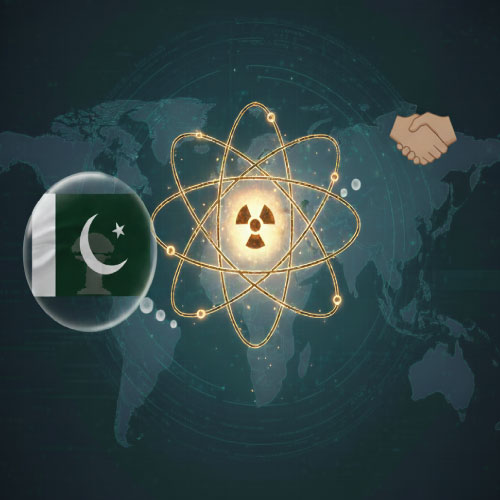For decades, the global security hallways have done lengthy discussions on the idea of an ‘Islamic Bomb’. This refers to the idea that Pakistan’s nuclear arsenal could be in service not just for its own interests but those of the broader Muslim World as well. Pakistan has consistently rejected this idea, insisting that its nuclear doctrine remains focused to deter India. However, recent strategic developments have reignited the interest in the term ‘Islamic Bomb’. Despite growing speculations, Pakistan’s nuclear posture remains defensive, reflecting a continued commitment to regional stability and responsibilities of a nuclear-armed state.
“No one should attribute a religious label to the success achieved by our nuclear scientists. It is incorrect to call it an ‘Islamic bomb’”, stated the Prime Minister of Pakistan, Nawaz Sharif in June 1998. Furthermore, Tariq Altaf, a spokesman for Pakistan’s Foreign Ministry, said in an interview, “Nothing gives me more offense than the use of the phrase Islamic bomb,’ “There is no such thing as an Islamic bomb. This is a weapon for the self-defense of Pakistan — period. There is no question of transferring the technology to anybody. This is deterrence for Pakistan alone.” Time and again, the top leadership of Pakistan has refuted the existence of an Islamic bomb, despite there being a popular notion in some circles that Pakistan’s nuclear bomb gives the entire Muslim world a security blanket; however, this notion does not take into account the fact that Pakistan’s nuclear posture and developments are India centric.
The year 2025 witnessed the resurgence of the term that had been long refuted. On September 17, 2025, Pakistan and Saudi Arabia signed a Strategic Mutual Defense Agreement. While the specifics of the agreement remain largely undisclosed, it outlines that any act of aggression against one of the countries shall be regarded as an act of aggression against both.
Earlier this year, soon after the four day Indo-Pak military conflict, Geneva Center for Security Policy discussed the conflict in one of its publications titled as “The Indo-Pakistani Conflict in Light of the “Islamic Bomb”. Pakistani officials, adhering to the country’s longstanding policy, have consistently rejected any notion that its nuclear weapon constitutes an ‘Islamic Bomb’. Shafqat Ali Khan, spokesperson of Pakistan’s Ministry of Foreign Affairs said in a press briefing, “Pakistan’s position on the nuclear arsenal remains clear and unchanged”.
Despite Pakistan’s consistent refusal to label its nuclear arsenal as a bomb for the Muslim World and emphasizing its existence solely to deter India, the question arises: why is the term “Islamic Bomb” resurfacing now?
In 1974, Pakistan hosted the second OIC conference, a pivotal gathering of the Muslim leadership. During the conference, Pakistan embraced the idea of fostering unity within the Ummah and advocated for the collective use of resources for emancipation and protect the rights of Muslim nations. At the time, Pakistan was in dire need of financial assistance from the oil-rich Arab states as the nuclear project posed a huge strain on the national treasury. In their book, The Islamic Bomb: The Nuclear Threat to Israel and the Middle East, Steve Weissman and Herbert Krosney argue that the ambiguity surrounding the concept of Islamic bomb, without offering explicit umbrella cover to the entire Muslim world, was strategically crafted to meet this very need.
In the early 1980s, at the height of Pakistan’s nuclear development efforts, then-President Zia-ul-Haq asserted that Pakistan had the right to acquire nuclear technology and once it did, the entire Muslim world posses it. In his book Going Nuclear, L.S. Spector notes that with the nuclear bomb, Pakistan’s ambitions were to take on a leadership role in the Muslim world. The Washington Post, in June 1998 highlighted that the idea of an ‘Islamic Bomb’ had also gained traction among several Muslim countries, many of which called on Pakistan to shoulder the responsibility of Ummah’s collective defense. Egypt’s Grand Mufti even urged the entire Muslim World to rally behind Pakistan in support of its nuclear program. However, Pakistan’s nuclear doctrine, posture and development remained strictly India centric. Despite, some wishes and assumptions, Pakistan did not show any inclination to adopt the concept of extended deterrence.
Another term, increasingly discussed in recent publications like Sky News and China Global South Project, is the “Islamic NATO”. This comes despite the earlier rejection of Egypt’s proposed idea of an “Arab NATO” during the September’s Doha Summit. Now, several Arab states, apart from Saudi Arabia, appear willing to join Pakistan for bilateral and multilateral defence pacts. This shift apparently follows the September 9 Israeli attack on Doha, which shattered the illusion of US security guarantees in the Gulf region; however, it might be under consideration way before this attack because it is unlikely that Pakistan is going to finalize an agreement within a few weeks without any discussion before. In search for a more dependable security partner, Pakistan, a country with a battle-tested military, network centric warfare experience has emerged as a plausible option for these states. Nevertheless, it is also important note here that despite aspirations of Islamic NATO, Muslim countries did not agree to such proposal when leaders of Muslims met after the Doha attack. Therefore, the narrative of an Islamic NATO doesn’t hold ground.
Similar terms are also being echoed within Indian strategic circles, where the general atmosphere, according to a BBC report, is one of being sidelined following the signing of Saudi-Pak agreement. Indian strategists believe that Riyadh was aware the pact would unsettle Delhi, yet it went ahead with it. Former Indian foreign secretary Kanwal Sibal described the agreement as a serious misstep by Riyadh. However, analysts like Ahmed Aboudouh argue that the pact doesn’t pose any immediate security threat to India. Instead, it places Delhi into unfavorable optics, as it plays a diminishing role in the rapidly evolving security landscape of the Middle East. However, Saudi Arabia can help Pakistan strengthen its military and integrate new technologies by providing economic support. This partnership can also contribute to maintaining strategic stability in South Asia, where India is receiving assistance from multiple Western partners as well as Russia. The Saudi alliance with Pakistan could, therefore, play a vital role in ensuring long-term peace in the region.
In conclusion, due to Pakistan-Saudi Defense agreement, some circles are trying to sell old wine in a new bottle. However, Pakistan did not change anything nuclear posture. Its defense pacts with Saudi Arabia or other Middle Eastern countries appear to be primarily in conventional domain and for defensive purpose. Maintaining this stance is crucial for ensuring stability in an increasingly volatile region while upholding Pakistan’s reputation as a responsible nuclear state.
Author’s Bio
Maheen Butt is working as a Content Writer with over 5 years of experience in the industry, having a particular interest in geopolitics and security studies.

